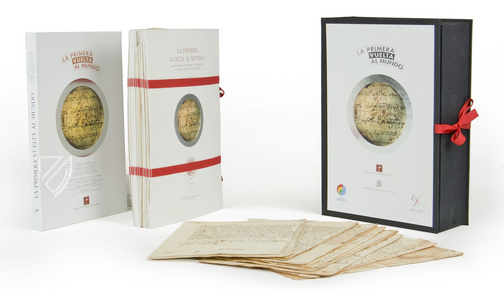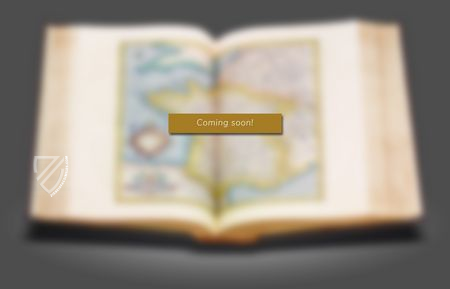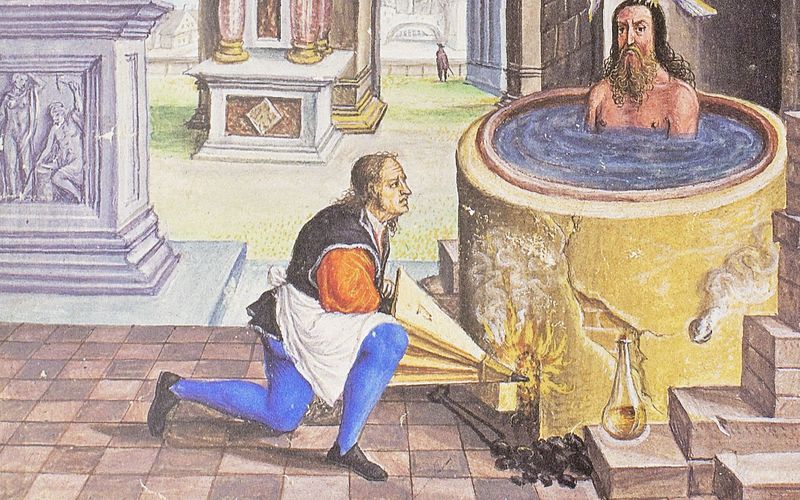Tordesillas Treaties
(1,000€ - 3,000€)
The famous Treaty of Tordesillas divided the world in 1494 between the two greatest sea-powers and forces of discovery of the time: Spain and Portugal. The agreement was proposed and implemented by none less than Pope Alexander VI, the highest authority of the Catholic powers. After the unbelievable discoveries of the 15th centuries and the still-awaited further discoveries of new lands and regions, this New World had to be divided up. Thus the Treaty of Tordesillas, which followed several papal bulls, secured a definitive line of demarcation. The regions lying to the west of the line, thus the Americas – up to modern Brazil – were awarded to the Spanish, and the eastern regions went to Portugal. The treaty offers an exciting glimpse into this great Age of Discovery and the reorganization of the world!
Tordesillas Treaties
The famous Treaty of Tordesillas divided the world in 1494 between the two greatest sea-powers and forces of discovery of the time: Spain and Portugal. The agreement was proposed and implemented by none less than Pope Alexander VI, the highest authority of the Catholic powers. After the unbelievable discoveries of the 15th centuries and the still-awaited further discoveries of new lands and regions, this New World had to be divided up. Thus the Treaty of Tordesillas, which followed several papal bulls, secured a definitive line of demarcation. The regions lying to the west of the line, thus the Americas – up to modern Brazil – were awarded to the Spanish, and the eastern regions went to Portugal. The treaty offers an exciting glimpse into this great Age of Discovery and the reorganization of the world!
An Imaginary Line through the Atlantic
“[…] a boundary or straight line be determined and drawn north and south, from pole to pole, on the said ocean sea, from the Arctic to the Antarctic pole. This boundary or line shall be drawn straight, as aforesaid, at a distance of three hundred and seventy leagues west of the Cape Verde Islands, being calculated by degrees, or by any other manner as may be considered the best and readiest, provided the distance shall be no greater than above said. And all lands, both islands and mainlands, found and discovered already, or to be found and discovered hereafter, by the said King of Portugal and by his vessels on this side of the said line and bound determined as above, toward the east, in either north or south latitude, on the eastern side of the said bound provided the said bound is not crossed, shall belong to, and remain in the possession of, and pertain forever to, the said King of Portugal and his successors. And all other lands, both islands and mainlands, found or to be found hereafter, discovered or to be discovered hereafter, which have been discovered or shall be discovered by the said King and Queen of Castile, Aragon, etc., and by their vessels, on the western side of the said bound, determined as above, after having passed the said bound toward the west, in either its north or south latitude, shall belong to, and remain in the possession of, and pertain forever to, the said King and Queen of Castile, Leon, etc., and to their successors.”
Lucrative Business and Exotic Lands
The Treaty of Tordesillas was concluded on June 7th, 1494, and was ratified on July 2nd by Spain and on September 5th by Portugal and from then on regulated the territorial claims between the two great sea-powers. They were in competition in particular for the numerous new discoveries of islands and whole continents in the 15th century. The so-called New World was to be divided into a Spanish and a Portuguese half. The focus of the Portuguese kingdom lay in maintaining the control of the sea route to India along the African coast. India and the sea route there and back promised, among other things, the profitable spice trade in the Pacific region. This African route was to be free of competing Spanish influence. Thus was the Spanish royal house allowed to seek a sea route to India over the Atlantic and in doing so discovered an unknown continent: America. They wanted to secure the control and right over these lands, which were first discovered by Christopher Columbus, in the west. The Portuguese King John II namely allowed, among others, for the proclamation of the Brazilian coast as a Portuguese region. Naturally, the Spanish did not want to allow that to happen.
The Pope as Arbitrator
The Borgia Pope Alexander VI (1492–1503) intervened as arbitrator between the two competing parties in the division of the New World. The pope held the highest authority in the Catholic lands and his word had to be complied with by both Spain as well as Portugal. At the end of the 15th century, there came a flood of papal bulls, which were meant to regulate the matter. Among them was the 1481 bull Aeternis regis that gave all regions south of the Canary Islands to Portugal. In the year 1493 there were several papal bulls, among them the bull Inter caetera, in which a line of demarcation was established. Portugal was nonetheless not in agreement with this and thus tough negotiations began. An agreement was reached about the shift of the line westward, so that Brazil went to Portugal.
A Final Settlement
This settlement was finally sealed in the famous Treaty of Tordesillas. Other sea powers such as England, Holland, or France were completely unaccounted for, as were the rights of the indigenous populations of the newly discovered regions. Agreements were recorded across the eight pages of the historically significant contract that would influence the further course of world history. It is an unbelievably exciting document of a 15th century and a certificate of the division of the world!
Codicology
- Alternative Titles
- Tratados de Tordesillas
Acta de los tractados de Tordesillas I y II
Vertrag von Tordesillas - Size / Format
- 8 pages / 32.0 × 23.0 cm
- Origin
- Spain
- Date
- 1494
- Epochs
- Style
- Language
- Script
- Cortesana
Tordesillas Treaties
Spanish Copy
This copy of the treaty was given to King Ferdinand II of Aragon and Queen Isabella I of Castile, who are named in the elaborately-written first line of the document. A masterful scribe was obviously responsible for the neatly written yet highly stylized text with numerous flourishes and embellishments. Ferdinand and Isabella were officially bestowed with the title “the Catholic Monarchs of Spain” by Pope Alexander VI in 1494, the same year that the Treaty of Tordesillas was signed.

Tordesillas Treaties
Portuguese Copy
The twin copies of this historic agreement are among the most prized historic treasures in the national archives of Spain and Portugal. This copy bears the name of its recipient, King John II of Portugal, and is affixed with his royal seal: argent, five escutcheons in cross azure each charged with as many plates in saltire, all within a bordure gules charged with seven golden triple-towered castles.
This document is written in an exquisite hand with letters written with incredibly disciplined uniformity and spacing, as well as an important passage written in bold for emphasis. A splendid “D” initial precedes the text and is intricately patterned in such a way as to appear woven or braided – the result of a series of precise pen strokes.

#1 Tratado de Tordesillas
Languages: Spanish or English
(1,000€ - 3,000€)
- Treatises / Secular Books
- Apocalypses / Beatus
- Astronomy / Astrology
- Bestiaries
- Bibles / Gospels
- Chronicles / History / Law
- Geography / Maps
- Saints' Lives
- Islam / Oriental
- Judaism / Hebrew
- Single Leaf Collections
- Leonardo da Vinci
- Literature / Poetry
- Liturgical Manuscripts
- Medicine / Botany / Alchemy
- Music
- Mythology / Prophecies
- Psalters
- Other Religious Books
- Games / Hunting
- Private Devotion Books
- Other Genres
- Afghanistan
- Armenia
- Austria
- Belgium
- Colombia
- Croatia
- Cyprus
- Czech Republic
- Denmark
- Egypt
- Ethiopia
- France
- Germany
- Greece
- Hungary
- India
- Iran
- Iraq
- Israel
- Italy
- Japan
- Lebanon
- Luxembourg
- Mexico
- Morocco
- Netherlands
- Palestine
- Peru
- Poland
- Portugal
- Russia
- Serbia
- Spain
- Sri Lanka
- Sweden
- Switzerland
- Syria
- Turkey
- Ukraine
- United Kingdom
- United States
- Uzbekistan
- Aboca Museum
- Ajuntament de Valencia
- Akademie Verlag
- Akademische Druck- u. Verlagsanstalt (ADEVA)
- Aldo Ausilio Editore - Bottega d’Erasmo
- Alecto Historical Editions
- Alkuin Verlag
- Almqvist & Wiksell
- Amilcare Pizzi
- Andreas & Andreas Verlagsbuchhandlung
- Archa 90
- Archiv Verlag
- Archivi Edizioni
- Arnold Verlag
- ARS
- Ars Magna
- ArtCodex
- AyN Ediciones
- Azimuth Editions
- Badenia Verlag
- Bärenreiter-Verlag
- Belser Verlag
- Belser Verlag / WK Wertkontor
- Benziger Verlag
- Bernardinum Wydawnictwo
- BiblioGemma
- Biblioteca Apostolica Vaticana (Vaticanstadt, Vaticanstadt)
- Bibliotheca Palatina Faksimile Verlag
- Bibliotheca Rara
- Boydell & Brewer
- Bramante Edizioni
- Bredius Genootschap
- Brepols Publishers
- British Library
- C. Weckesser
- Caixa Catalunya
- Canesi
- CAPSA, Ars Scriptoria
- Caratzas Brothers, Publishers
- Carus Verlag
- Casamassima Libri
- Chavane Verlag
- Christian Brandstätter Verlag
- Circulo Cientifico
- Club Bibliófilo Versol
- Club du Livre
- CM Editores
- Collegium Graphicum
- Collezione Apocrifa Da Vinci
- Comissão Nacional para as Comemorações dos Descobrimentos Portugueses
- Coron Verlag
- Corvina
- CTHS
- D. S. Brewer
- Damon
- De Agostini/UTET
- De Nederlandsche Boekhandel
- De Schutter
- Deuschle & Stemmle
- Deutscher Verlag für Kunstwissenschaft
- DIAMM
- Droz
- E. Schreiber Graphische Kunstanstalten
- Ediciones Boreal
- Ediciones Grial
- Ediclube
- Edições Inapa
- Edilan
- Editalia
- Edition Deuschle
- Edition Georg Popp
- Edition Leipzig
- Edition Libri Illustri
- Editiones Reales Sitios S. L.
- Éditions de l'Oiseau Lyre
- Editions Medicina Rara
- Editorial Casariego
- Editorial Mintzoa
- Editrice Antenore
- Editrice Velar
- Edizioni Edison
- Egeria, S.L.
- Eikon Editores
- Electa
- Emery Walker Limited
- Enciclopèdia Catalana
- Eos-Verlag
- Ephesus Publishing
- Ernst Battenberg
- Eugrammia Press
- Extraordinary Editions
- Fackelverlag
- Facsimila Art & Edition
- Facsimile Editions Ltd.
- Facsimilia Art & Edition Ebert KG
- Faksimile Verlag
- Feuermann Verlag
- Folger Shakespeare Library
- Franco Cosimo Panini Editore
- Friedrich Wittig Verlag
- Fundación Hullera Vasco-Leonesa
- G. Braziller
- Gabriele Mazzotta Editore
- Gebr. Mann Verlag
- Gesellschaft für graphische Industrie
- Getty Research Institute
- Giovanni Domenico de Rossi
- Giunti Editore
- Graffiti
- Grafica European Center of Fine Arts
- Guido Pressler
- Guillermo Blazquez
- Gustav Kiepenheuer
- H. N. Abrams
- Harrassowitz
- Helikon
- Hendrickson Publishers
- Henning Oppermann
- Herder Verlag
- Hes & De Graaf Publishers
- Hoepli
- Holbein-Verlag
- Hortus Deliciarum
- Houghton Library
- Hugo Schmidt Verlag
- Idion Verlag
- Il Bulino, edizioni d'arte
- ILte
- Imago
- Insel Verlag
- Instituto Nacional de Antropología e Historia
- Istituto dell'Enciclopedia Italiana - Treccani
- Istituto Ellenico di Studi Bizantini e Postbizantini
- Istituto Geografico De Agostini
- Istituto Poligrafico e Zecca dello Stato
- Italarte Art Establishments
- J. Thorbecke
- Jan Thorbecke Verlag
- Johnson Reprint Corporation
- Josef Stocker
- Josef Stocker-Schmid
- Jugoslavija
- Karl W. Hiersemann
- Kasper Straube
- Kaydeda Ediciones
- Kindler Verlag / Coron Verlag
- Kodansha International Ltd.
- Konrad Kölbl Verlag
- Kurt Wolff Verlag
- La Liberia dello Stato
- La Linea Editrice
- La Meta Editore
- Lambert Schneider
- Landeskreditbank Baden-Württemberg
- Leo S. Olschki
- Les Incunables
- Library of Congress
- Libreria Musicale Italiana
- Lichtdruck
- Lito Immagine Editore
- Lumen Artis
- Lund Humphries
- M. Moleiro Editor
- Maison des Sciences de l'homme et de la société de Poitiers
- Manuscriptum
- Martinus Nijhoff
- Maruzen-Yushodo Co. Ltd.
- MASA
- McGraw-Hill
- Militos
- Millennium Liber
- Müller & Schindler
- Nahar and Steimatzky
- National Library of Wales
- Neri Pozza
- Nova Charta
- Oceanum Verlag
- Odeon
- Orbis Mediaevalis
- Orbis Pictus
- Österreichische Staatsdruckerei
- Oxford University Press
- Pageant Books
- Parzellers Buchverlag
- Patrimonio Ediciones
- Pattloch Verlag
- PIAF
- Pieper Verlag
- Plon-Nourrit et cie
- Prestel Verlag
- Princeton University Press
- Prisma Verlag
- Priuli & Verlucca, editori
- Pro Sport Verlag
- Propyläen Verlag
- Pytheas Books
- Quaternio Verlag Luzern
- Reales Sitios
- Recht-Verlag
- Reichert Verlag
- Reichsdruckerei
- Riehn & Reusch
- Roberto Vattori Editore
- Rosenkilde and Bagger
- Roxburghe Club
- Salerno Editrice
- Sarajevo Svjetlost
- Schöck ArtPrint Kft.
- Scolar Press
- Scrinium
- Scripta Maneant
- Scriptorium
- Siloé, arte y bibliofilia
- SISMEL - Edizioni del Galluzzo
- Sociedad Mexicana de Antropología
- Société des Bibliophiles & Iconophiles de Belgique
- Soncin Publishing
- Sorli Ediciones
- Stainer and Bell
- Studer
- Styria Verlag
- Sumptibus Pragopress
- Szegedi Tudomànyegyetem
- Taberna Libraria
- Tarshish Books
- Taschen
- Tempus Libri
- Testimonio Compañía Editorial
- Thames and Hudson
- The Clear Vue Publishing Partnership Limited
- The Facsimile Codex
- The Folio Society
- The Marquess of Normanby
- The Richard III and Yorkist History Trust
- Tip.Le.Co
- TouchArt
- TREC Publishing House
- TRI Publishing Co.
- Trident Editore
- Typis Regiae Officinae Polygraphicae
- Union Verlag Berlin
- Universidad de Granada
- University of California Press
- University of Chicago Press
- Urs Graf
- Vallecchi
- Van Wijnen
- VCH, Acta Humaniora
- VDI Verlag
- VEB Deutscher Verlag für Musik
- Verlag Anton Pustet / Andreas Verlag
- Verlag Bibliophile Drucke Josef Stocker
- Verlag der Münchner Drucke
- Verlag für Regionalgeschichte
- Verlag Styria
- Vicent Garcia Editores
- W. Turnowsky
- Waanders Printers
- Wiener Mechitharisten-Congregation (Wien, Österreich)
- Wissenschaftliche Buchgesellschaft
- Wydawnictwo Dolnoslaskie
- Xuntanza Editorial
- Zakład Narodowy
- Zollikofer AG







































